Share
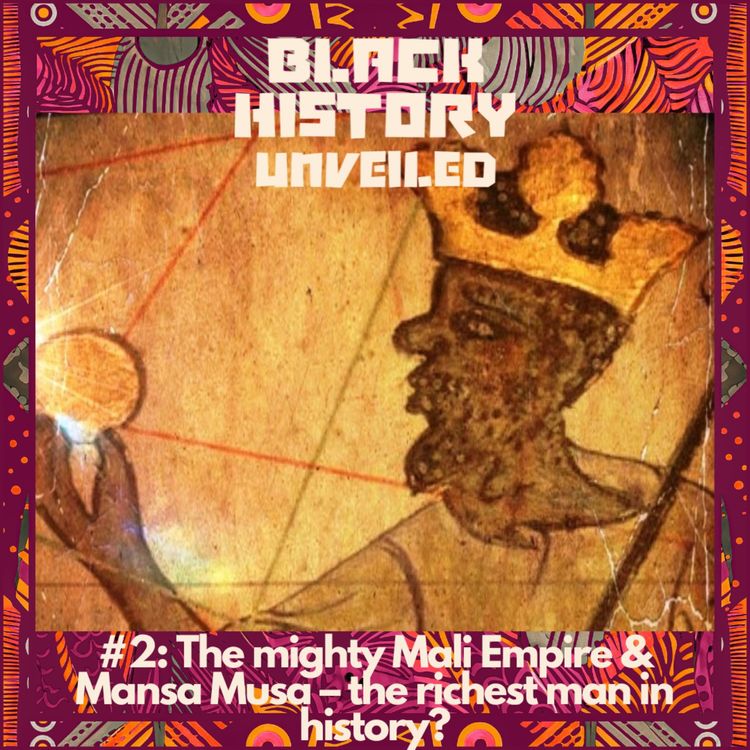
Black History Unveiled
#2: The mighty Mali Empire & Mansa Musa – the richest man in history?
•
Today's episode is about a place where some people believed valuable minerals grew in the ground and were picked as plants. An immense empire serving as a center of trade and religion, supplying Europe, North Africa, and the Middle East with much-coveted gold.
But it was also a place that may have inspired Europeans to venture further out into the seas than ever before, with consequences no one could have imagined. This is the story of Mansa Musa and the Mali Empire.
More episodes
View all episodes
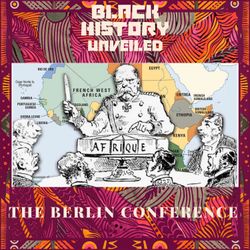
#13: The Berlin Conference
29:20|Today's episode is about an incredibly impactful moment in world history – one that reshaped not only the African continent but also the Western world. It influenced the development of modern Europe and the formation of Black diasporas across the globe. Today's episode is about the Berlin Conference: perhaps one of the most famous events in the West tied to Africa – yet also one of the most misunderstood.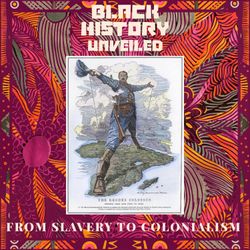
#12: From Slavery to Colonialism
44:23|In this episode of the Black History Unveiled podcast, we delve into a pivotal moment in history, not just for Africa but for Europe and beyond – a moment that has helped shape the modern world. Our focus today is on the period following the horrors of the transatlantic slave trade, a time that evolved into the crushing weight of colonialism. We'll explore how these two devastating eras bled into one another and the long-lasting consequences for the people and regions affected.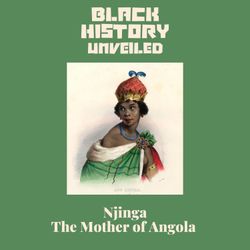
#11: Njinga – The Mother of Angola
58:23|Today's episode of the Black History Unveiled podcast is about one of pre-colonial Africa's most famous regents. A woman who, for several decades, resisted Portugal's attempt to conquer her country. A woman whose actions throughout history have been both demonized and glorified. Today's episode is about Njinga – the mother of Angola – and the woman who, in the 17th century, was prepared to do everything to avoid losing her country.
Interview: Beata Umubyeyi Mairesse on the aftereffects of the 1994 genocide in Rwanda
45:43|In today's episode of the Black History Unveiled podcast, I interview Rwandan-French author Beata Umubyeyi Mairesse about her book "All Your Children, Scattered". It is a novel about the aftereffects of the 1994 genocide in Rwanda, told through three generations. Beata's latest book, "The Convoy", is about her own experiences of the genocide. She was only a teenager when it happened, and the book tells the story of how she escaped the killings and how she, as an adult, tries to piece together the accounts of other survivors.
Interview: Sonya Lindfors on intersectionality, decolonization, and race in the art space
43:17|In today's episode of the Black History Unveiled podcast, I interview Cameroonian-Finnish choreographer and artistic director Sonya Lindfors. We spoke literally minutes after she had just directed and starred in her piece "One Drop." We talk about intersectionality, decolonization, audience reactions, how discussions on race and identity have evolved in the art space, plus much more. Enjoy!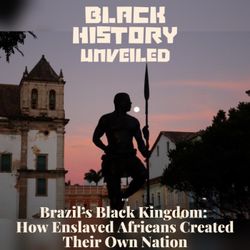
#10: Brazil’s Black Kingdom: How Enslaved Africans Created Their Own Nation
36:29|The last main episode of Black History Unveiled explored the rise and fall of the Kingdom of Kongo—a powerful Central African state that met a devastating blow at the hands of the Portuguese in 1665. In the aftermath, Kongo not only lost its king but also saw much of its nobility captured, enslaved, and forcibly taken across the Atlantic.Most of them vanished into the brutal anonymity of the transatlantic slave trade, their names erased from history. But not all. Some survived the passage of time. One such figure is Ganga Zumba.Leading a daring escape, he and other fugitives from slavery carved out a stronghold deep in the jungles of Brazil.This is the story of how enslaved Africans fought back, built their own nation, and came close to toppling the Portuguese colonial power.
Minisode: Kendrick Lamar & The 40 Acres
15:19|The conversation around Kendrick Lamar's Super Bowl performance is in full swing. Every detail is being dissected, from his set list and relentless jabs at Drake to his vision for the future of hip-hop. Fans and critics alike are also trying to unpack the layers of symbolism woven into his set. One phrase, in particular, has sparked a wave of questions: "40 acres and a mule." What's its history, and why does it still resonate today? I break it down in today's episode.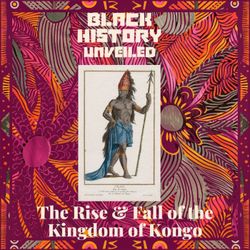
#9: The Rise & Fall of the Kingdom of Kongo
53:18|Season 2 of the Black History Unveiled podcast is here! And the first episode is about a Central African kingdom that dominated its region during the 15th, 16th, and 17th centuries. This kingdom initially enjoyed a close relationship with Portugal, a relationship that eventually devolved into horrific scenes. This kingdom's fate had profound consequences for the entire Western Hemisphere. Today's episode is about the rise and fall of the Kingdom of Kongo.
Minisode: A reintroduction of female genital mutilation in The Gambia?
08:15|Today’s minisode of the Black History Unveiled podcast is about the fight to reintroduce female genital mutilation (FGM) in The Gambia. And how it’s a part of a global movement where, primarily, conservative men seek to maintain and/or regain control over women's bodies and sexuality.